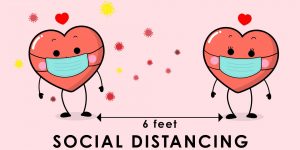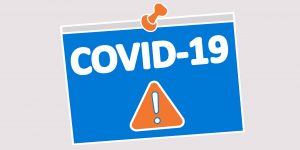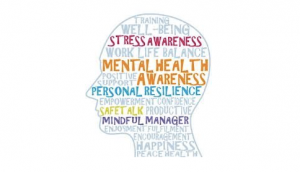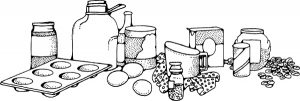

Valentine’s Day
What is Valentine’s Day and how did it start?
Valentine’s Day started in 500 A. D. It was started by Pope Saint Gelasius I, the third pope of the Catholic Church. He named the day after Saint Valentine or Saint Valentinus. The name Valentine is derived from a Latin word “valens” meaning worthy, strong or powerful.


To protect yourself and others, the ADH recommends:
- Get the COVID-19 vaccine when it is available to you. Click here for more information about vaccination.
- Wash your hands often with soap and water for at least 20 seconds. Use hand sanitizer when soap and water are not available.
- Practice physical distancing. Avoid close contact with others, especially those who are sick, by keeping at least 6 feet between you and others.
- If you think you have been exposed to COVID-19 or develop a fever, cough, or shortness of breath, seek testing. Testing is available in many locations, including ADH Local Health Units.
- Wear a face covering when you are exposed to non-household members and physical distancing cannot be assured. Click here to read the requirements.

EMOTIONAL WELLBEING

What to do with intense emotions:
These days, a lot of things can trigger intense emotions. Political, social, and cultural topics often bring a wide variety of perspectives and discourse. What you choose to do with your strong emotions when they show up is what matters most, particularly where your health is concerned.
Although it can be tempting to want to suppress strong emotions, ignoring them can have a negative effect on your health. A better solution is to find healthy ways to release them.
Here are some positive ways to manage your emotional energy:
Physical Activity
Moving your body is a simple way to release tension and shift your mindset. As you move, your body releases feel-good endorphins that help calm your emotions.
Therapy
Discussing your feelings with a trained therapist or trusted friend can be helpful when you need to process or work through a complicated situation.
Acupuncture
While the research is still inconclusive, mostly due to the small number of subjects in studies conducted to date, there is some evidence that acupuncture can alleviate pain and anxiety by increasing endorphins.
Journaling
Because therapeutic journaling requires the use of both left brain and right brain functions, it is an effective way to process challenges and reduce the intensity of emotions.
Primal Therapy
Scream therapy, or Primal Therapy, has been used by clinical psychologists for decades to treat anxiety, depression, and trauma. While it is an unconventional method, it has been shown to be
effective for some.
Meditation
Research has shown that mindfulness-based stress reduction (MBSR) techniques, such as meditation, can be an effective coping strategy when it comes to regulating emotions.
Learning how to manage stress is an important part of your wellbeing. Experiment with a few
different emotional management strategies to find out which ones are most effective for you.
Building Resiliency:
Resiliency has become a popular topic within wellness circles. That is because there is strong evidence suggesting that resilient people are better at managing stress and moving through life’s difficult moments. Psychological resilience is defined as the ability to adapt when faced with adversity. To build resilience, you need to understand how stress impacts you, so you can develop specific strategies to work your way through those difficult situations.
Here are a few ways to strengthen your resilience:
Practice Self-Care
Create a list of self-care strategies you can lean on when times are tough. Eating well, exercising, and getting enough sleep can dramatically improve your ability to deal with stressful situations. When you have a plan in place before you face a challenge, it is much easier to navigate your way through it.
Strengthen Your Circle
Having a trusted support system to turn to when you face tough circumstances can alleviate stress and help you find solutions more quickly. Research has shown that simply having a strong support network makes you more resilient.
Focus on Solutions
It can be tempting to focus your energy on problems, but giving your attention to solutions is a much better use of your energy. By refocusing your lens on solutions, you will be able to find your way through challenging circumstances more easily.
Give Yourself Space
Sometimes the best thing you can do when facing an overwhelming circumstance is give yourself space. Go for a walk. Sit in silence. Press the pause button to see the problem more clearly.
Building resiliency can change the way you respond when life-changing situations arise.
Journaling can be used as a stress management tool…
Everyone experiences stress from time to time, but it can lead to a whole host of health problems if left unaddressed for long periods of time. One of the most common tools used for stress management is journaling. Getting your thoughts and feelings out of your head and onto paper can help you uncover the root causes of stress, so you can address it more effectively.
Journaling removes you from the situation itself and invites you to become an observer. By stepping back from the strong emotions tied to a specific event, you are able to see it differently.
Journaling can take many forms, and there is no wrong way to do it. Here are some different ways to journal:
Gratitude Journaling
Counting your blessings is beneficial to your health. Gratitude journaling involves taking inventory of what is going well, helping you to refocus your attention on the positive aspects
of your life. In fact, research has shown that gratitude journaling can even improve your health biomarkers.
Freestyle Journaling
Writing without rules is the foundation of freestyle journaling. This open-ended format involves an uninhibited stream of writing. The objective is to simply release your thoughts and feelings as they come to you.
List Journaling
List-making can be an extremely helpful form of journaling when you need to find solutions to a problem. You might create a pros and cons list or brainstorm possible ways you could improve a situation.
Journaling is a simple stress management tool that offers helpful insights about the sources of stress in your life.

Salmon Cakes with Potato and Fire Roasted Corn Salsa
INGREDIENTS
SALMON AND POTATO CAKES
• 2 medium russet potatoes, peeled and quartered
• 1 can of salmon (6 ounces), drained
• 1 small onion, chopped or grated
• 1 egg
• 1/4 cup flour
• ¼ cup fresh dill, chopped
• ¼ teaspoon salt
• ¼ teaspoon pepper
• 6 tablespoons extra virgin olive oil for frying
FIRE ROASTED SALSA
• 2 large ears corn, shucked
• 1 medium red pepper, diced
• 1 jalapeño, diced
• 12 cherry tomatoes, cut in half
• 2 tablespoons cider vinegar
• Salt and pepper, to taste
INSTRUCTIONS
1. Make Fire Roasted Salsa. Peel and roast corn on a gas burner or on a grill. Shave corn off the cob with a knife into a mixing bowl.
2. Add rest of salsa ingredients. Mix well. Salt and pepper, to taste.
3. Next make the salmon cakes. Boil peeled potatoes until soft, then drain in a colander. Mash potatoes with a fork.
4. In a large bowl, flake salmon with a fork. Add onion, egg, flour, dill, 1/4 teaspoon salt, 1/4 teaspoon pepper and potatoes. Mix well with a fork.
5. Make 12 patties. Heat olive oil on medium heat in a frying pan. Fry until golden brown on each side (about 5 minutes per side). Drain on a paper towel.
6. Serve salmon cakes with fire roasted salsa.
Total Time (Cook and Prep): 30 minutes
Servings: 4
NUTRITION INFO:
(per serving)
Calories kcal 443
Carbs g 32
Fat g 26
Protein g 22
Sodium mg 317
Sugar g 5
